I am ever so grateful and honoured to have been given a free place as an emerging researcher at the three day Forum for Access and Continuing Education (FACE) Conference by Krisha Bainham, Head of Widening Access, as my themes for my presentation aligned almost perfectly (if there is such a thing) with the themes of the conference.
The first day of the Conference was nothing short of inspiring. Gathering at the atrium of the University of Derby, delegates from across the globe and the UK began their journey of exploration around the themes of co-creation, transformative change, and social justice.
The conferenced commenced with a networking dinner, an opportunity for delegates to familiarise with one another, sharing their backgrounds, experiences, and expectations for the conference. As the atrium buzzed with engaging conversations, the sheer diversity of the delegates was evident. Despite our varied fields and backgrounds, our common commitment to advancing education and fostering social justice served as the thread binding us together.
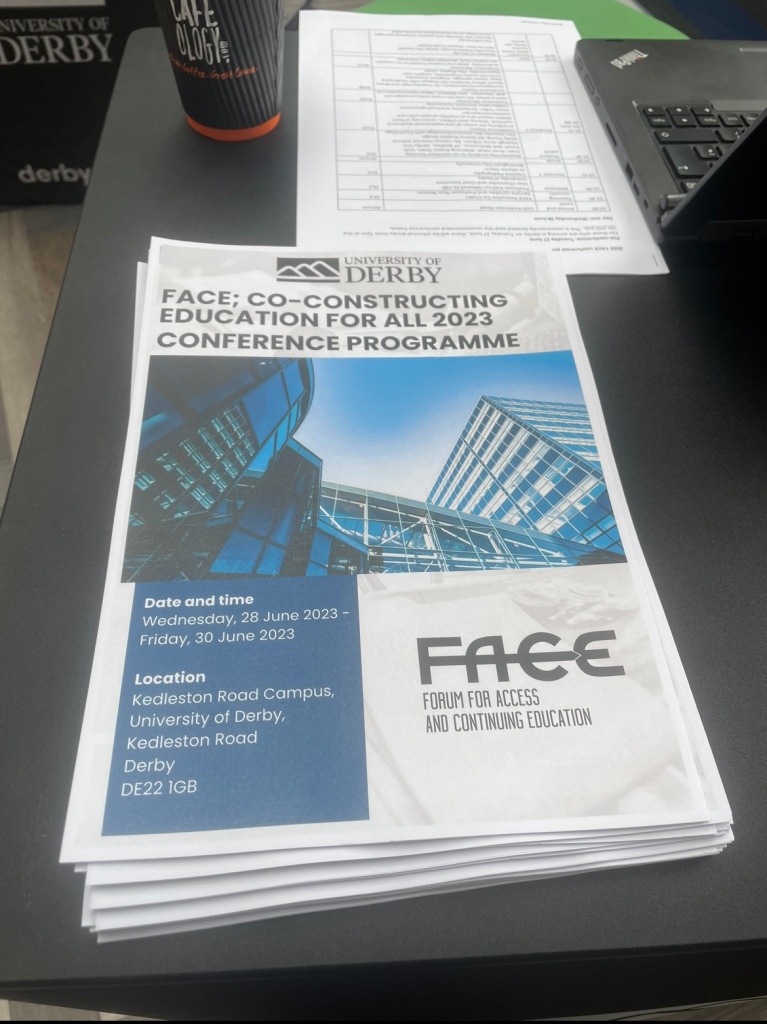
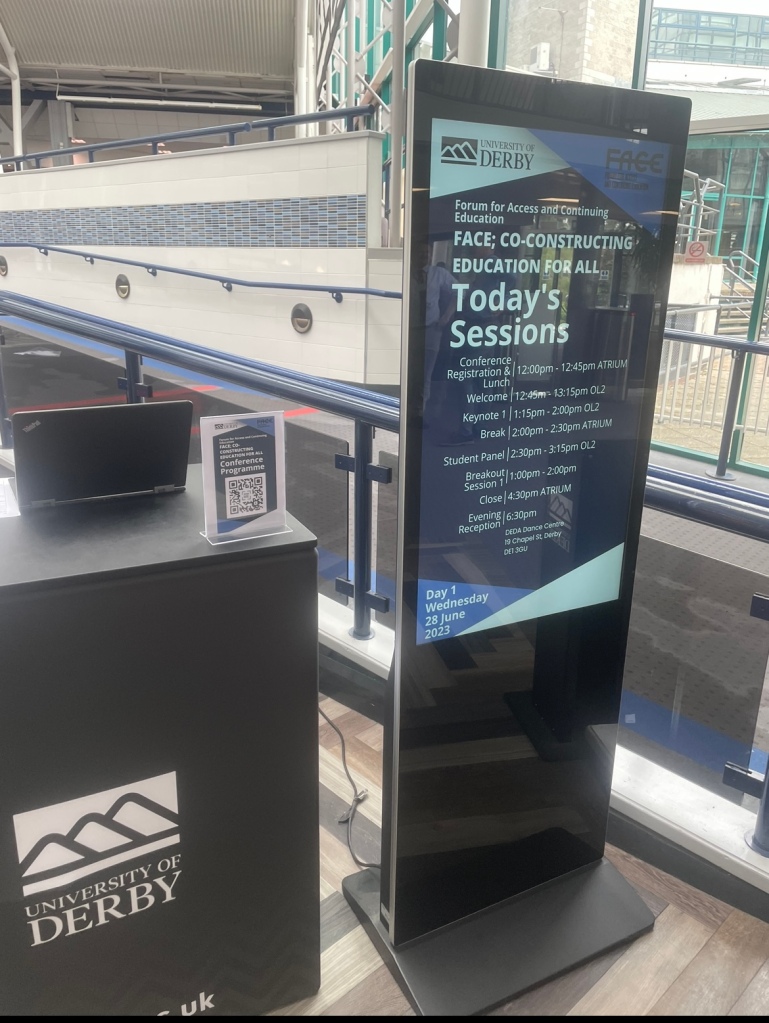
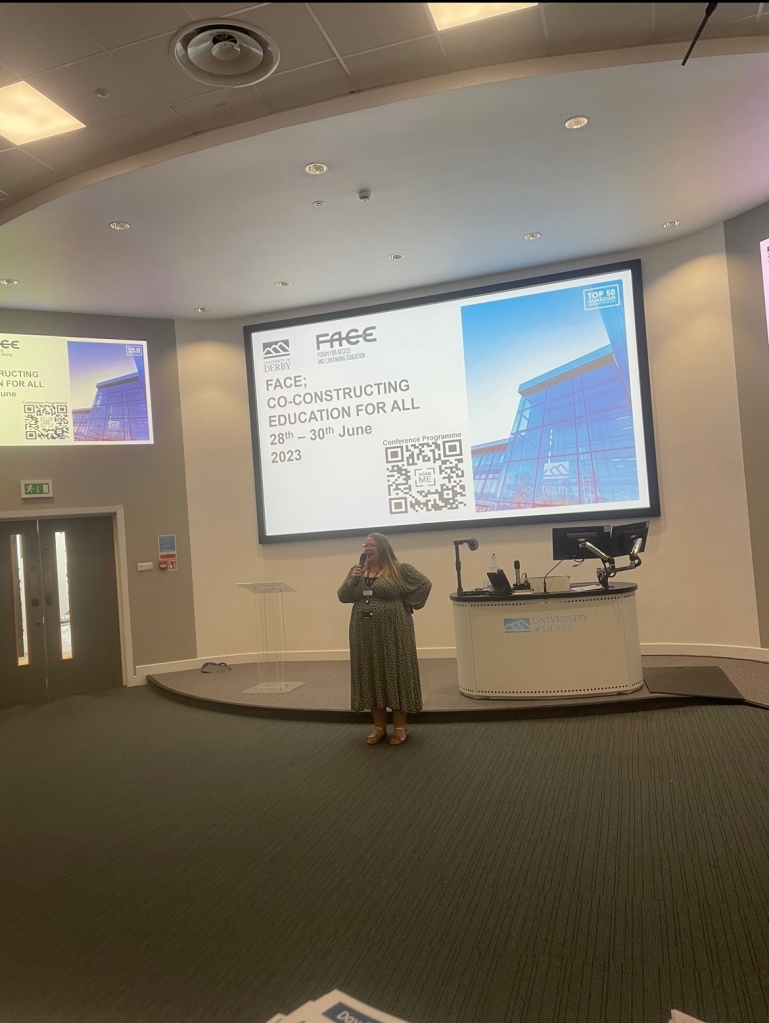
Professor Kath Mitchell’s Insightful Address at the FACE Conference: A Shift Toward Inclusive Higher Education
Professor Kath Mitchell, Vice-Chancellor of the University of Derby, opened the conference following the opening dinner, emphasising the University’s commitment to inclusive, accessible education. She underscored the necessity of collaboration, of co-creation, in shaping the future of education. Her words set the tone for the conference, reminding us that we were not just passive recipients of knowledge, but active contributors in the creation of innovative educational practices.
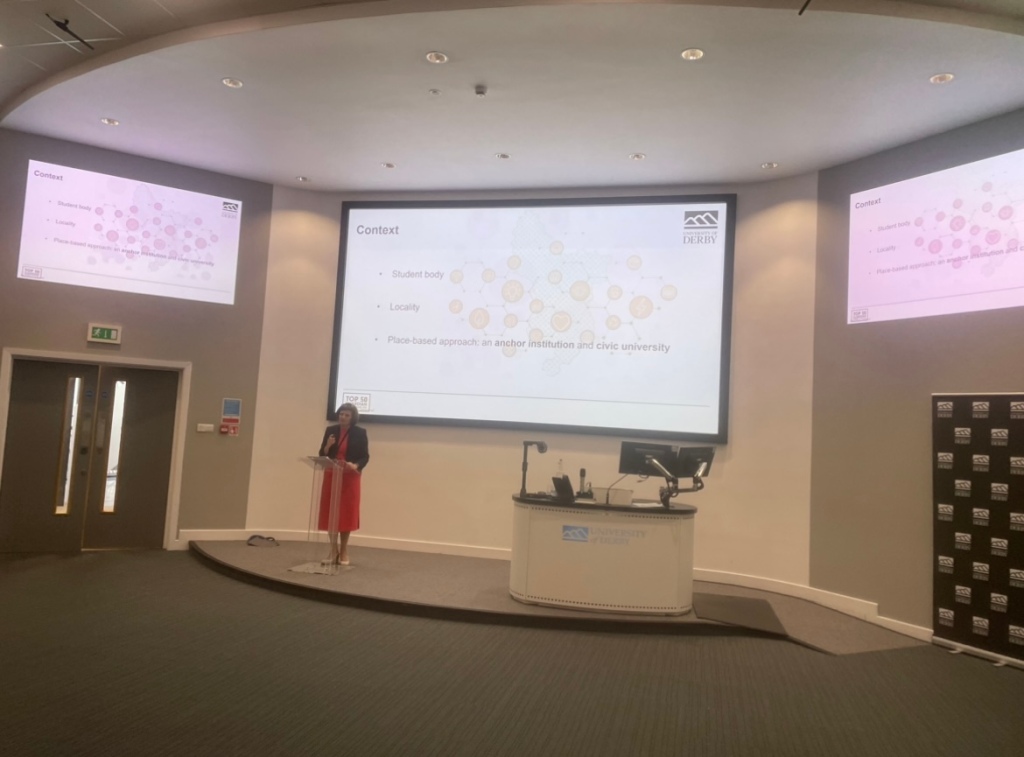
Kath brought to the fore pivotal issues about the importance of not just academics but understanding one’s place in society and the significance of civic positioning.
The VC underlined how the University of Derby has been working to level the playing field. She presented compelling statistics: 84% and 72% of participants in the university’s progressive programs came from backgrounds with no experience of higher education and were from the most deprived areas in England, respectively. These figures underscore how the university is striving to reach out to those who could benefit the most from education.
Kath highlighted that the aim is not to pressure these individuals into university but to empower them with experiences and knowledge that enable them to make self-determined decisions about their futures. The key, she believes, is to help them realise the transformational power of education.
The VC further revealed some remarkable success rates with a 32% increase in people feeling they could attend university and 63% of the targeted group managing to do so. Importantly, 76% of these students graduate, an encouraging figure that Kath believes must be followed up with monitoring of subsequent social mobility.
An intriguing part of the opening by Kath was the discussion about the “Derby Scholars” initiative – a partnership with Oxford and Cambridge universities. This innovative program seeks to open up opportunities for Derby city students to experience the elite learning environments. Not all choose to take up the opportunity, but those who do have shown outstanding results. This endeavour has also led to an encouraging shift in the student demographics of these prestigious universities.
In closing, Kath called for more collaboration and coherence across the sector. She urged for a unified front in education, advocating for the necessity of opportunity and the paramountcy of choice.
Dr Martin Glynn – Transformative Change
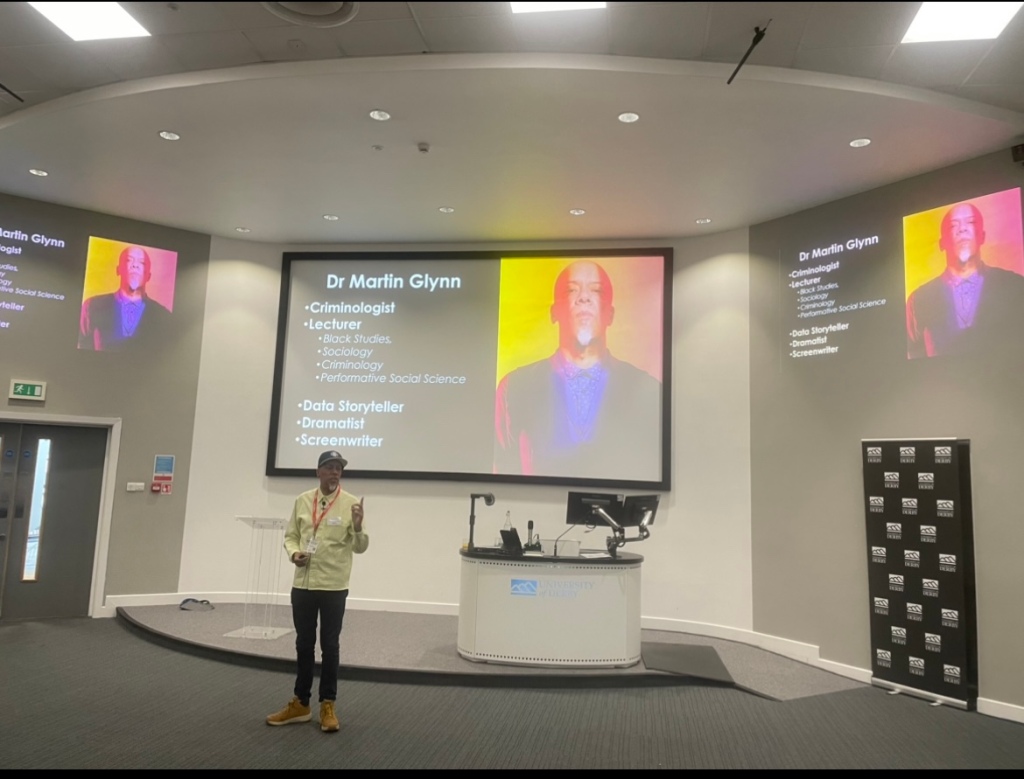
This lead nicely to the keynote by Dr Martin Glynn in which his refreshing demeanour and energy was captivating. Martin, an eminent criminologist, educator, and storyteller, wove together personal anecdotes, cross-cultural experiences, and an unshakeable commitment to social justice, leaving a lingering impression on all participants.
Martin’s narrative spanned continents and contexts, from the streets of Houston to the classrooms of Cambridge and the Welsh Literature Festival, echoing the concept of co-creation through collective experiences. He reminded us that wisdom often comes from unexpected sources, urging us to appreciate the knowledge each person brings.
Martin’s commitment to an inclusive, participatory approach to knowledge creation underscored the conference theme of co-creation. He argued that learning is not confined to formal educational spaces but permeates every aspect of life. The emphasis on empathy and understanding of lived experiences championed an approach to education that was both diverse and inclusive.
His discussion around transformative change and social justice resonated deeply with the audience. Martin envisioned a future where education can serve as a powerful agent for social change. Despite his personal experiences of racism and discrimination, he maintained an inspiring resilience, using humour and keen observation to challenge societal inequities.
His speech was a compelling demonstration of the intersection of the personal and the universal, the individual and the community, and the power of co-creation in transformative change and social justice.
Reflecting on the first day of the FACE conference, we were left with questions to ponder and inspire our future discussions:
- How can we foster a culture of co-creation in our respective fields?
- How can we use education as a tool for transformative change and social justice?
- How can our personal experiences inform our professional practice and commitment to social justice?
- How can we use our platforms and resources to challenge societal inequities and foster an inclusive, equitable world?
- How can we harness the power of storytelling to deepen learning and understanding?
With these questions echoing and resonating with me, I was filled with further exploration and inspiration, as the day progressed to collectively strive to advance the cause of co-creation, transformative change, and social justice.
Reflecting on the Empowering Student Panel: Co-Constructing Learning
Following on from Dr Martin Glynn was a Student Panel discussion titled “Empowering Students to Co-Construct Learning,” chaired by Arvin Johal from the Widening Access Team at UoD, I was struck by the power and significance of the student voice. Joined by Jack McGuiness (VP Welfare, Derby UoS), two passionate Student Ambassadors, Kayleigh Anne O’Brien (BSc Forensic Science) and Molly Young (BA Graphic Design), as well as Tino Savanhu (BSc Criminology with Psychology), the panel shed light on the importance of co-construction in education.
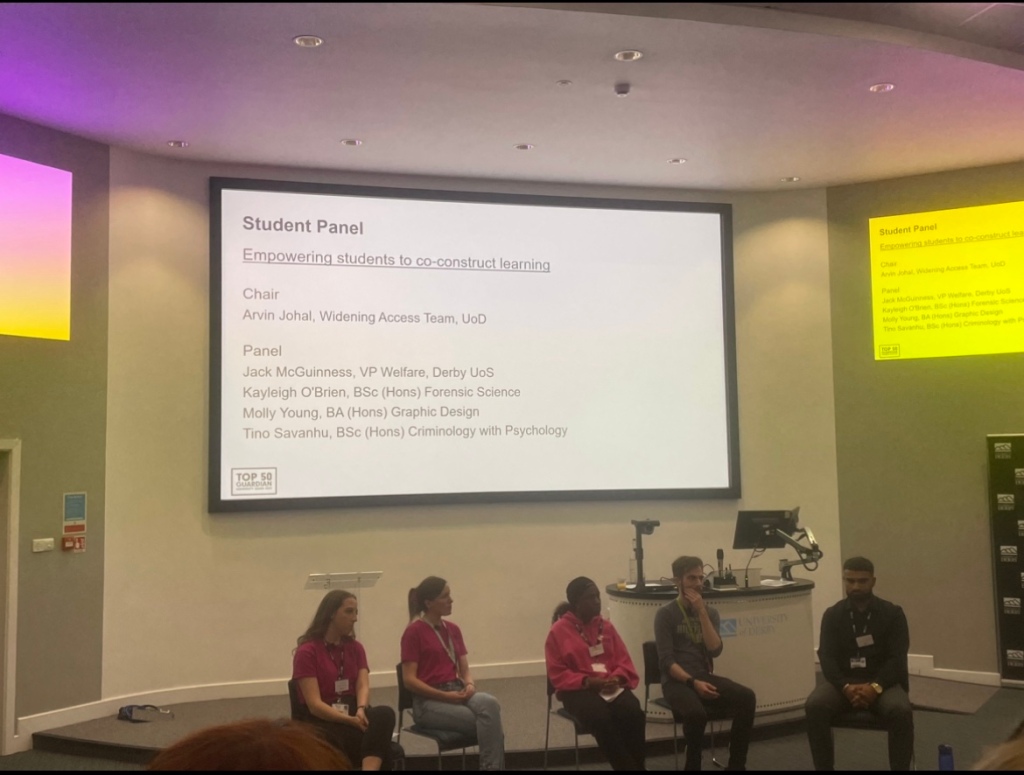
Throughout the session, I found myself captivated by the authenticity and passion coming across from the students. Their voices carried weight as they shared their experiences and perspectives on co-constructing learning, leaving an indelible mark on all who listened. It became evident that the student voice is an invaluable resource, often underutilised in the educational realm.
What resonated deeply with me was the notion of fostering genuine partnerships between students and staff. It goes beyond merely seeking student feedback or providing a platform for them to voice their opinions. True co-construction involves actively involving students in shaping their own learning experiences, granting them agency in decisions that directly impact their educational journey. It entails creating an environment that nurtures curiosity, embraces questioning, and genuinely values student input.
Each panelist brought their unique perspective and personal experiences to the table, illustrating the diverse ways in which students can and should be engaged in their own learning. The candid insights shared by these students reaffirmed the idea that when students are empowered to co-construct their learning environments, their level of engagement and investment in their education skyrockets.
This enlightening session served as a poignant reminder that education is not solely about disseminating knowledge but rather about cultivating a collaborative space where students and educators come together to shape the educational landscape. By involving students in the co-construction process, we equip them with the tools to actively shape their academic experiences, fostering a sense of ownership and deepening their commitment to learning.
The student panel’s compelling dialogue underscored the ongoing need to seek, amplify, and integrate student voices into our educational practices and structures. Students are not passive recipients of education; they are indispensable partners in the learning journey. When their perspectives are acknowledged and valued, their sense of belonging and engagement flourishes, resulting in a more enriching educational experience for all.
Fostering Courageous Conversations in Higher Education: Insights from Karen Lipsedge
The next session was a breakout session titled “Courageous Conversations: Co-Creating Safe and Brave Spaces Where Students Can Engage with Challenging Ideas.” The speaker was the insightful Dr Karen Lipsedge, an Associate Professor from Kingston University.
Karen’s talk revolved around the immense value of ‘courageous’ conversations – those challenging discussions that can often be difficult to navigate but which foster deeper connections, shared understanding, and enhanced learning experiences. As Karen eloquently argued, when we sidestep these conversations, we inadvertently miss out on these opportunities, creating a void in the broader learning journey.
One key point Karen emphasised was the role of these brave dialogues in cultivating a sense of belonging and value among students – an aspect critical in the university setting. By co-creating these conversational spaces with students, we enable them to become active participants in their education journey, thereby amplifying their engagement and sense of ownership.
She also underscored the importance of educators themselves becoming comfortable with the uncomfortable. It’s vital to understand that navigating these conversations requires us to step outside our comfort zones and bravely face the challenging issues at hand.
A crucial aspect of Karen’s talk was her emphasis on active engagement. Creating safe spaces for courageous conversations goes beyond mere understanding of the subject matter. It requires proactive interaction with students, the development of a comfortable and open environment, and the establishment of ground rules that respect confidentiality, power imbalances, and the importance of listening as much as speaking.
Karen shared insights from a project she had spearheaded, which gave us a firsthand look at the practical application of these principles. It was enlightening to see how she navigated these challenging conversations and how integral understanding students’ fears and concerns was in this process.
Moreover, Karenoutlined several guiding principles for these courageous conversations. The threefold approach included considering the aspects of space, time, and text, constant practice, and the importance of body language. Particularly intriguing was her emphasis on ‘calling in’ rather than ‘calling out,’ encouraging a dialogue that fosters learning, vulnerability, and growth instead of shame and silence.
Reflecting on this session, I was struck by the significance of these courageous conversations in the broader landscape of higher education. It’s not just about the subject matter we teach but also the environments we create and the values we uphold. It’s about fostering spaces of trust, openness, and mutual respect where students can learn, engage, and grow.
As educators, it is our responsibility to carry forward these strategies, to share them with our students and colleagues, and to continually evolve in our practices. As Karen pointedly asked, “So what?” After every session, every encounter, and every conversation, we must ask ourselves, “What now? What next?” And with these guiding questions, we can help shape a more inclusive, courageous, and engaged higher education landscape. This was then followed by a session with Ellie Rowling from UCAS.
Embracing Access and Inclusion in Higher Education: A UCAS Perspective
Ellie Rowley is part of the team leading the Fair Access program by UCAS. I’ve spent the past few days reflecting on her insightful talk, and I’d like to share my thoughts and takeaways in the hope they might resonate with others in the education sector.
At its core, the Fair Access program was born from the belief that we can and must do more to facilitate access to higher education for students from disadvantaged backgrounds. This ethos forms the bedrock of all UCAS’ initiatives – a sentiment that echoes deeply with my own belief in education as a great leveller.
Ellie’s emphasis on the importance of the personal statement, the UCAS calling card that many of us remember from our own university applications, served as a reminder of the multi-faceted nature of the admissions process. It’s not just about grades or potential, but about the individual and their unique journey.
A particularly compelling point of the session was the discussion around the “journey to a million.” According to a data model from Newcastle, we are expecting a million applicants to higher education by 2030. That’s a 30% increase from current application rates. While this may seem like a positive trend at first glance, it also implies an increase in competition, posing potential challenges for students from disadvantaged backgrounds.
Another memorable takeaway was the exploration of the series of 50 essays from 50 big thinkers, centred on the theme of widening access to higher education. This thought-provoking compilation, according to Ellie, offers a multifaceted examination of access to education, from the present landscape to future predictions. I have since delved into these essays and found them enlightening and engaging.
Rowley also highlighted the value of UCAS’ Next and Next Steps series, providing a wealth of insights on students’ intentions, motivations, and specific characteristics. These resources offer a deeper understanding of various student journeys, allowing us to tailor our outreach and support accordingly.
Looking to the future, Ellie spoke of new focal points for the Fair Access program, including an in-depth study on students living at home. This is a vital area to explore, given the increasing trend of students choosing to stay at home during their studies.
Reflecting on Ellie’s talk, I’m reminded of the importance of co-creation, engagement, and the commitment to ensuring all students, regardless of their background, have fair access to higher education. The challenges are significant, but as Ellie made clear, the opportunities are vast and inspiring.
In the face of the impending “journey to a million,” it’s more crucial than ever that we, as education professionals, rise to the occasion. By utilising data insights, focusing on widening access and ensuring fair play, we can help navigate students towards their future, no matter their starting point.
That concludes my reflections on day one of the education conference. There were so many thought-provoking insights and practices that I gleaned from Professor Kath Mitchell, Dr Martin Glynn, Associate Professor Karen Lipsedge, and Ellie Rowling. As I continue to process these powerful messages, I find myself inspired for what the future holds in the realm of higher education.
But the journey doesn’t end here! Stay tuned for my reflections on days two and three, where I’ll be diving deeper into more enlightening sessions, engaging dialogues, and innovative ideas that continue to reshape our understanding of education.
Whether you’re an educator, student, or simply a lifelong learner, I promise you there’s so much more to come. Until then, keep asking questions, keep having those courageous conversations, and keep fostering an environment that allows us all to grow and learn together. See you in the next posts!